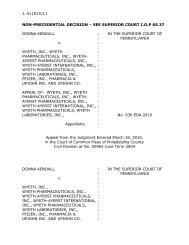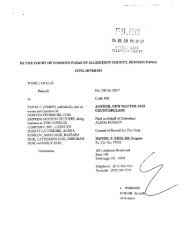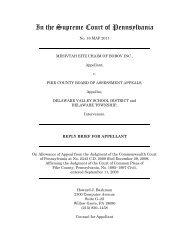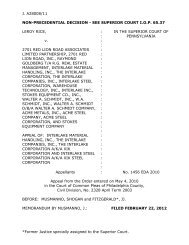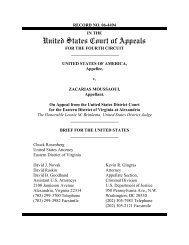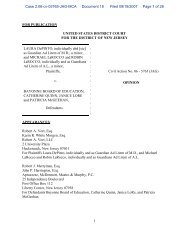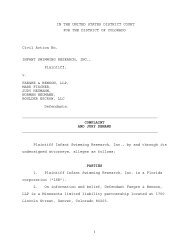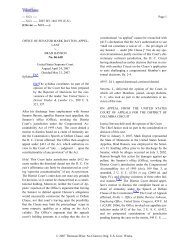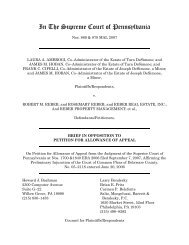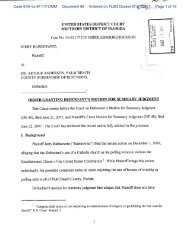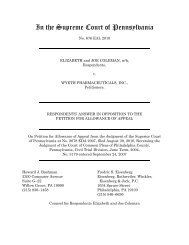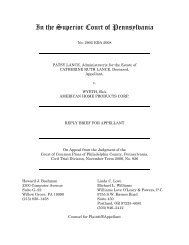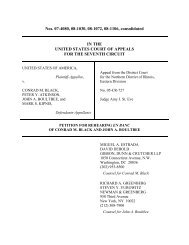Stone v. Bear, Stearns & Co., Inc. - How Appealing
Stone v. Bear, Stearns & Co., Inc. - How Appealing
Stone v. Bear, Stearns & Co., Inc. - How Appealing
You also want an ePaper? Increase the reach of your titles
YUMPU automatically turns print PDFs into web optimized ePapers that Google loves.
Case 2:11-cv-05118-LDD Document 22 Filed 05/29/12 Page 31 of 35<br />
award had full knowledge of the facts beforehand, but despite that knowledge, did not object until he<br />
or she lost. See, e.g., Apperson v. Fleet Carrier <strong>Co</strong>rp., 879 F.2d 1344, 1359 (6th Cir. 1989) (no<br />
waiver of evident partiality challenge unless challenger knew “all the facts” supporting the alleged<br />
bias during the proceedings); Early v. Eastern Transfer, 699 F.2d 552, 558 (1st Cir. 1983) (same);<br />
Middlesex Mut. Ins. <strong>Co</strong>. v. Levine, 675 F.2d 1197, 1204 (11th Cir. 1982) (holding that “[w]aiver<br />
applies only where a party has acted with full knowledge of the facts.”). We will call this the “actual<br />
knowledge” approach.<br />
Other courts take a broader view of waiver, holding that waiver applies if a party either knew<br />
or should have known of the arbitrator’s later-complained-of conflict or bias, which constructively<br />
puts the party on notice. See, e.g., Lucent, 379 F.3d at 28 (2d Cir. 2004) (stressing that the Second<br />
Circuit has “declined to vacate awards because of undisclosed relationships where the complaining<br />
party should have known of the relationship . . . or could have learned of the relationship just as<br />
easily before or during the arbitration rather than after it lost its case.”) (citations and internal<br />
quotations omitted); Remmey v. PaineWebber, <strong>Inc</strong>., 32 F.3d 143, 148 (4th Cir. 1994) (worrying that<br />
“[i]f . . . challenge [based on information that could have been discovered beforehand] were<br />
sustained, nothing would stop future parties to arbitration from obtaining allegedly disqualifying<br />
information, going through with the proceedings, and then coming forward with the information only<br />
if disappointed by the decision.”); Fidelity Fed. Bank, FSB v. Durga Ma <strong>Co</strong>rp., 386 F.3d 1306, 1313<br />
(9th Cir. 2004) (“constructive knowledge” of potential partiality of arbitrator is enough for waiver)<br />
(citing JCI <strong>Co</strong>mmc’ns, <strong>Inc</strong>. v. Int’l Bhd. of Elec. Workers, Local 103, 324 F.3d 42, 52 (1st Cir. 2003),<br />
and Kiernan v. Piper Jaffray <strong>Co</strong>s., <strong>Inc</strong>., 137 F.3d 588, 593 (8th Cir. 1998)); Van Pelt v. UBS Fin.<br />
Servs., No. 3:05CV477, 2006 WL 1698861, at *3 (W.D.N.C. June 14, 2006) (“It is well-settled that a<br />
complaining party does not have ‘two strings to the bow,’ and generally a party waives the right to<br />
31



